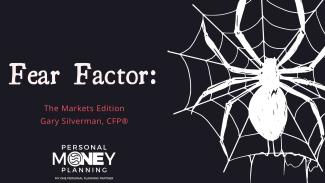
Fear Factor: The Markets Edition, Part 1
By Gary Silverman, CFP®
What makes the markets look scary? We’ll start this discussion by delving into the essentially zero interest rate the Federal Reserve and many other central banks have driven us to. Like most things in life, there are pros and cons.
The pro is that you (and everyone else) can borrow money for less than before. Need a house or a car? Go ahead and borrow—the rates are down. This means that more people can afford to buy more things.
While this might not be the best personal move for folks, it does help the economy. After all, if you are buying it, someone is making it, and their employees stay employed. But we’re not here for good news. I promised a look at the problems.
First, someone must lend you the money you borrow. That someone is a bank or other financial institution. This can be a problem for them. If they loan you money for a house at 3% interest for 30 years, they have to hope that across those 30 years their cost for the money is far enough under 3% to take into account loan losses, their expenses, and still make a profit.
Banks borrow money from you in the form of savings accounts and CDs in the short-term and lend in the long-term. If they get their future predictions wrong, there’s a lot of trouble in the future for them. Most of you remember a time when banks were paying well over 3% on their savings accounts and way higher on longer-term CDs. Might that be their future?
If you are wondering why we should care about the banking industry, take a moment to remember how much you liked the last banking crisis. But let’s forget about the banks for now. Let’s focus on people.
Sure, it’s nice to get a cheaper loan, but it’s not nice to get a smaller return. If you or your parents are the types who don’t feel warm and fuzzy about the stock market, you are probably in the bond and money markets. That’s where nice steady interest gets paid. And that interest is very, very low.
If you retired back when you could invest in 5-year CDs and make 4% on your money, but now you look around and they are paying 0.4%, you’ve taken a 90% loss in your income. That’s not pretty.
Now, some of you will say, “Sure, the interest is low, but inflation is low too.” And indeed, it is, but it’s higher than 0.4%. And while you are locking in your income for 5 years, inflation is free to go higher the entire time.
The connections between interest rates and stock market returns are not often obvious, with two exceptions. First, when interest rates rise from here, it will cost companies and their customers more to borrow, which dampens sales and profits.
Then there are the people who have put more money into stocks because bonds and cash pay so little. When interest rates rise, will there be enough incentive to move their money around?
Next week, we’ll take on another topic that makes the markets seem scary: the cheery topic of war.
Gary Silverman, CFP® is the founder of Personal Money Planning, LLC, a Wichita Falls retirement planning and investment management firm and author of Real World Investing.

